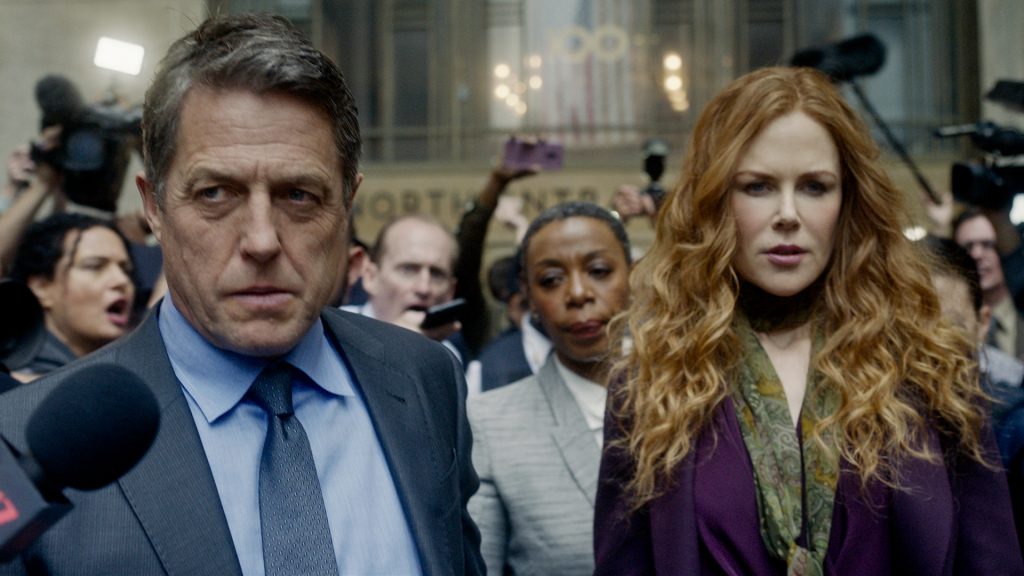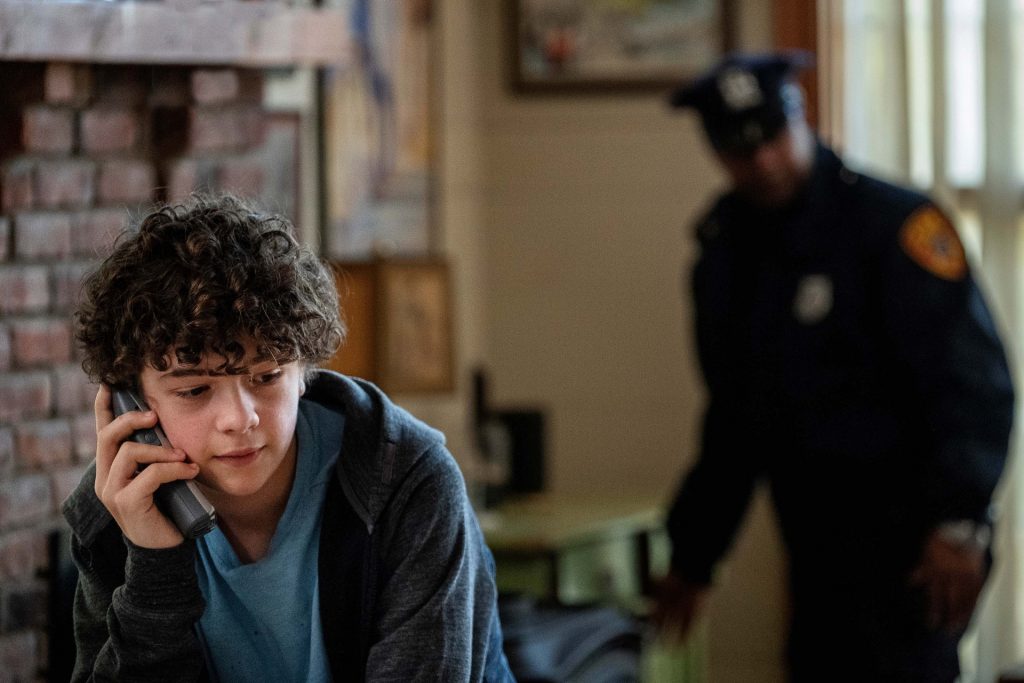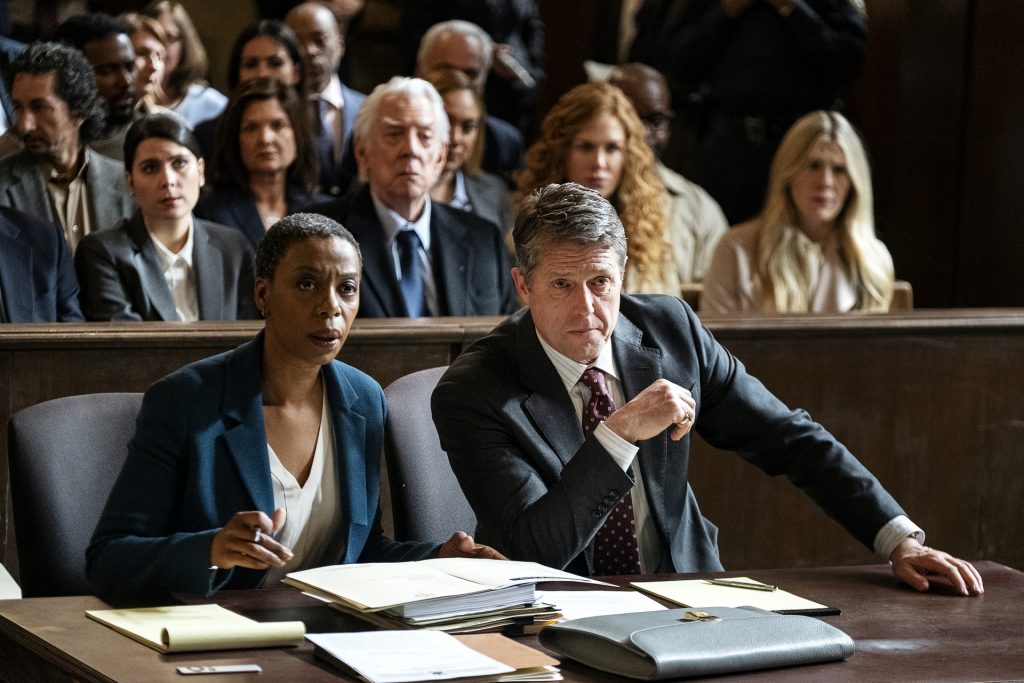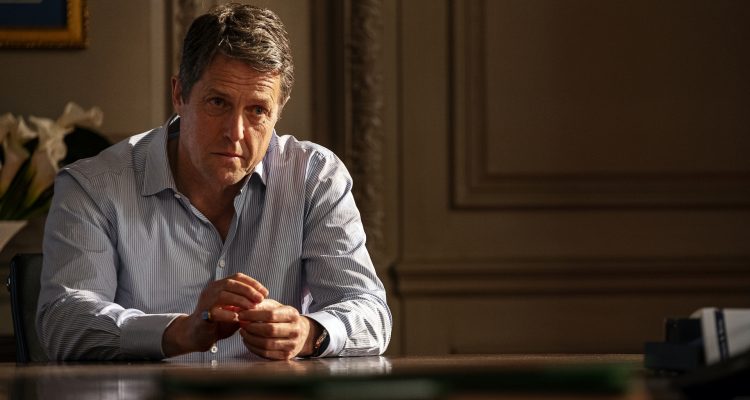While Emmy-nominee Hugh Grant is best known for playing the romantic lead in hit comedies such as Love, Actually, Notting Hill and Four Weddings and a Funeral, his latest role as the narcissistic, and possibly psychotic, Jonathan Fraser, in HBO’s The Undoing is his most versatile and intriguing to date.
The Academy award nominated actor finds himself more in demand then ever following his Emmy-nominated turn as Jeremy Thorpe in the deliciously absorbing BBC One series A Very English Scandal.
The Undoing is based on the 2014 novel You Should Have Known by Jean Hanff Korelitz, and focuses on Nicole Kidman’s Grace Fraser, a successful therapist, and her devoted husband Jonathan, played by Grant, whose seemingly perfect lives are upended after a violent death leads to a chain of terrible revelations.
Grant walks the thin line between being outwardly charming and harboring unconscionable secrets, keeping audiences guessing until even the final moments of the miniseries. Grant has received considerable acclaim for the role, particularly for transposing his charm into darker, messier characters.
“I had to be as convincing as I could be while protecting my [character’s] innocence,” Grant shares. “The best way to do that, while remaining true to the character, was to assume that Jonathan was one of those sociopaths who believes their own lies.”
Grant spoke with Awards Focus about writing the murder scene with director Susanna Bier, channeling raw emotions in The Undoing, and the advice that he takes from Meryl Streep.
Awards Focus: When you first talked to David E. Kelley about your role, how much material were you given? Did you have the whole character arc, or only the first two episodes?
Hugh Grant: Essentially I only knew that I was fishy. I was this sort of charming and marvelous doctor who then disappears. But I didn’t know if I was guilty or not. That was kind of key to deciding whether to take on the role or not.

AF: You were able to give some input regarding how some of the scenes were developed, such as writing the beats for how the murder should be shot. What was it like to offer your creative input in terms of writing and crafting those scenes?
Grant: Well, I have to be absolutely clear. This is 99.99%, written by the great genius David E. Kelley.
But there was an issue about my guilt. He told me I was guilty, and then four more episodes were written. When the fifth one appeared shortly before we started shooting episode one, I seemed quite guilty, but insufficiently guilty. In my opinion, I thought it would have been left with a slightly open end, so I objected.
Susanna Bier, who was directing, agreed with me and it was rewritten. She said, “Look, the clincher will be if we actually see the murder.” So she decided to shoot it. But David I think was unavailable for actually writing the murder, so in the end, Susanna and I kind of worked out a bit of murder, which we thoroughly enjoyed. We both relish the idea of murder, and there’s a lot of people we want to murder in real life. So it was fun.
AF: Before shooting scenes, what were your conversations like with David and Susanna in terms of writing and directing?
Grant: Well, David did quite a clever thing. He largely wrote and then disappeared. I don’t know if this is his normal process, but he wasn’t really around for rewrites and such because what he writes is actually so tight. It just doesn’t need that much work on the whole. So my conversations were mainly with Susanna, who’s been extremely collaborative and nice to me.
When you’re on set with Susanna before shooting a scene, she’s quite intimidating. She brings a real European auteur kind of determination to the set. It’s quite alarming when you first see it. But it works. She’s a genius and a great filmmaker.

AF: Noah Jupe is so incredible in this. What was it like to work alongside him?
Grant: Noah is one of those naturals, isn’t he? He’s a child prodigy. Well, he actually stopped being a child while we were shooting, which was slightly irritating. It was a six month shoot at the beginning of which he was a piping lad, by the end of which he was a bearded man. It was tricky from a continuity point of view. But in either manifestation, he’s a genius and he never puts a foot wrong.
AF: What was your process for managing the truth of Jonathan and the two different sides of him that we see in the show?
Grant: Well, the difficulty was that I had to appear credibly innocent. The audience was never 100% going to believe me, but it was important that they thought, “Well maybe, just maybe, he is innocent.” So I had to be as convincing as I could be while protecting my innocence.
The best way I found to do that, while remaining true to the character, was to assume that Jonathan was one of those sociopaths who believes their own lies, so they’re not really lying. They actually believe it. He believes he’s innocent. He believes that the great Jonathan Fraser, curer of children and medical star, cannot possibly have hammered a woman to death. So there’s this outward Jonathan who we see for 90% of the time and then you get a brief glimpse of the real guy, a person that Jonathan himself doesn’t like to confront that often.
But you get a glimpse of him in Episode Six, when you see my last encounter with my poor victim. You see it flashing through, breaking the surface, like the back of a shark, in the car scene with my son.
AF: What is your process like when you encounter a scene that allows you to engage in a strong emotional way?
Grant: Traditionally, these are scenes I’ve dreaded in my career. It all started with Florence Foster Jenkins, when in the final scene of that film and Meryl’s character’s dying, the script said, “Bayfield sobs uncontrollably.” I thought, “Jesus, I’ve had a whole career of doing witty one-liners. I can’t do that kind of acting.” I said to [director] Steven Frears “I can’t do that.” He said, “Don’t worry. Just do your best to look sad.” And I did do my best. I got myself in the mood, put on headphones, and listened to my sad playlist. To my complete astonishment, found that I did cry. From that moment on, I really can’t stop crying in scenes.
I think it’s something to do with having children and, after decades of being a desiccated old bachelor, suddenly being exposed to all this love and emotion. But I now find emotions much more accessible. That’s not to say it’s easy, but at least it’s there. So yes, those prison scenes did seem to loom towards me. And it’s hard work. But at the same time, I’m reminded of Meryl [Streep], who once said that she prided herself throughout her whole career on always being in the correct emotional state — a different emotional self that she has to portray.
I’ve always tried my best to emulate that, because the one thing I’ve learned over the years is that the camera smells fake crud. It’s incredibly sensitive to anything phony, so you have to bring as much of the real stuff as you can.

AF: What was it like seeing people’s reactions to The Undoing when it was released?
Grant: It was a terrifying process, because it’s not something you’re accustomed to in the film world. You can’t read Twitter as people are watching a film for the first time. But with TV, you can, though I probably shouldn’t have done so. It’s probably masochistic.
What’s odd is that I skipped through the thousands of positive things they were saying in search of the negative ones, which I always agreed with. It’s so weird.
Jacob Romines also contributed to this article.


